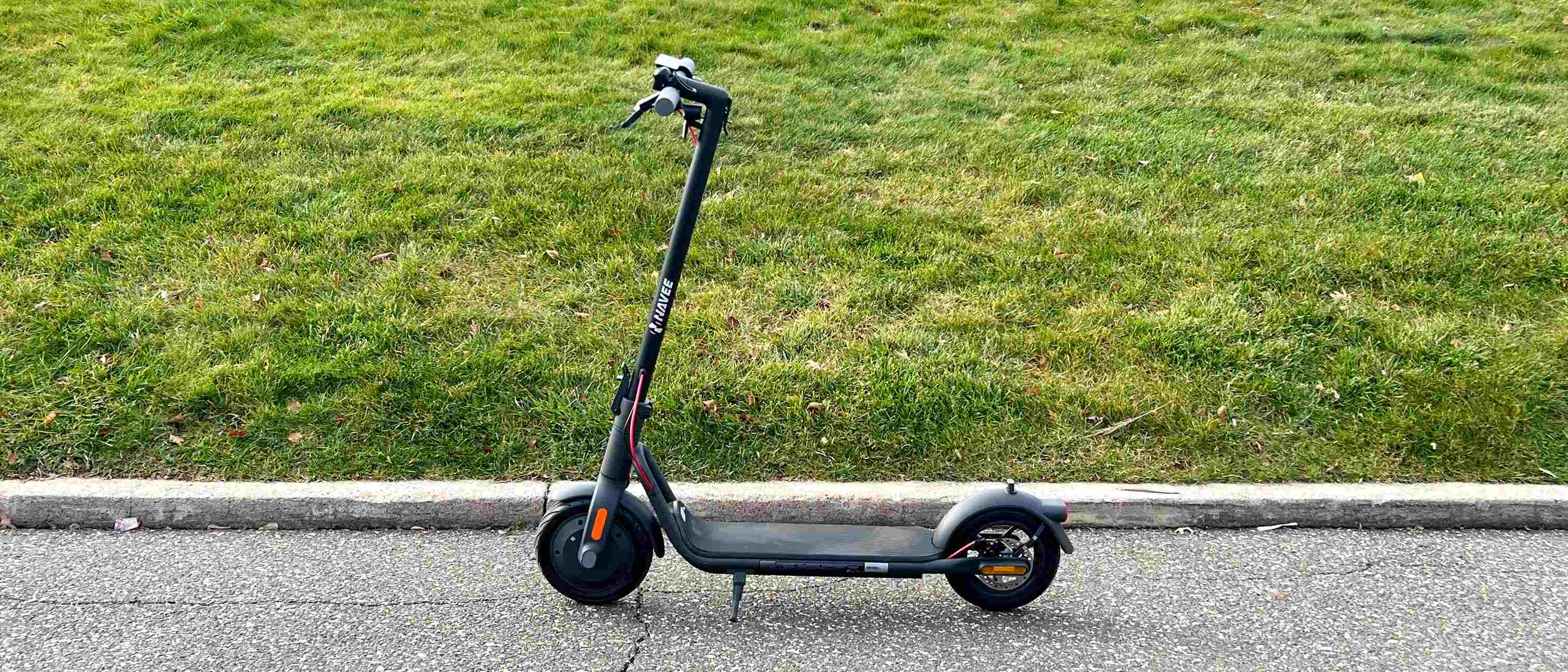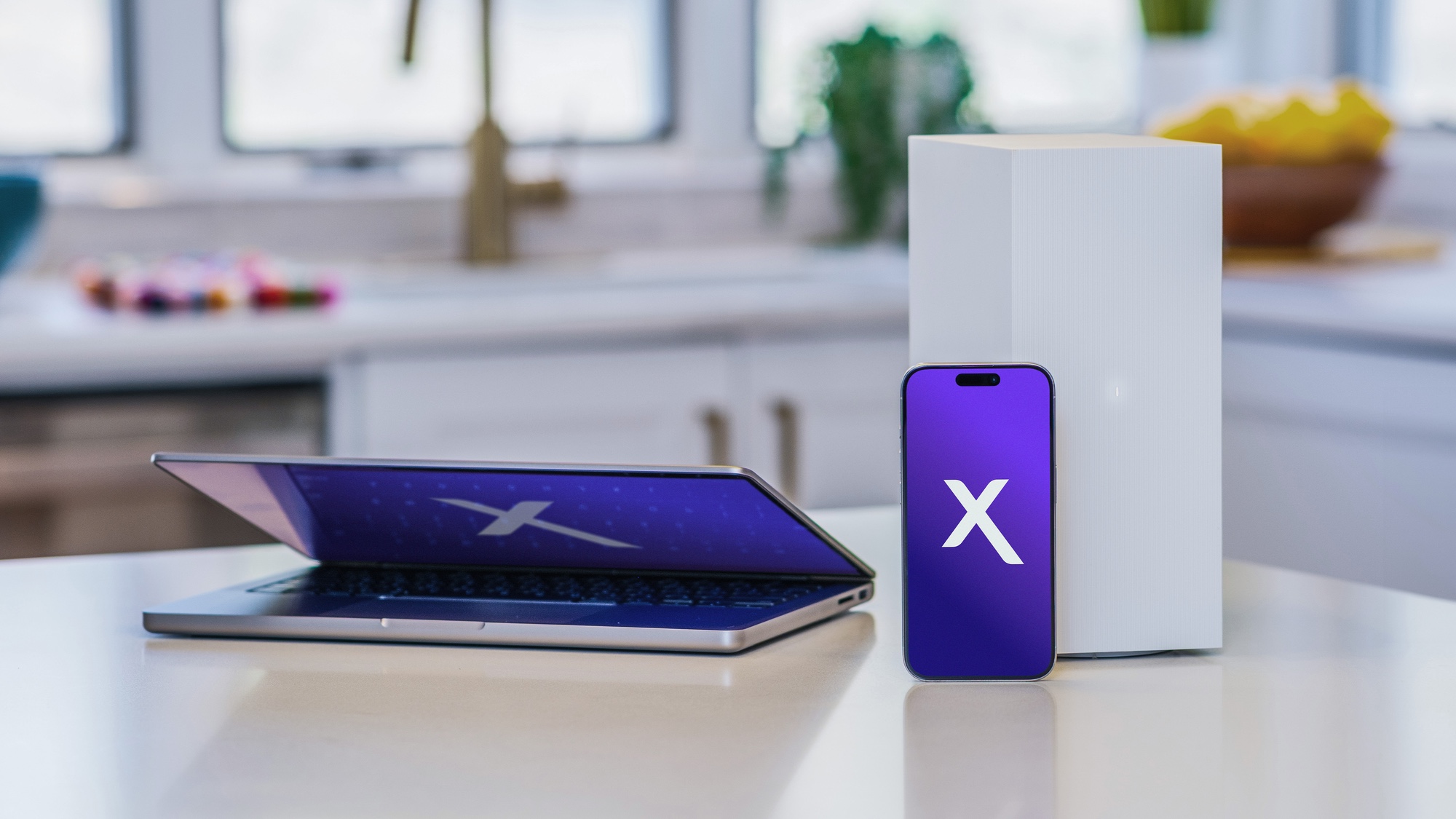Tom's Guide Verdict
The NAVEE V40 Pro is a solid mid-range electric scooter with a good range for its price, and a unique folding design that makes it more compact than competitors. It’s a comfortable ride for city commuting or suburban errand-running.
Pros
- +
Good range
- +
Decent shock absorption
- +
Innovative dual-folding system
Cons
- -
No foot brake
- -
Air-filled tires more prone to flats
Why you can trust Tom's Guide
Size (unfolded): 44.9 x 19.1 x 45.9 inches
Size (folded): 44.9 x 6.3 x 19.9 inches
Weight: 35 pounds
Motor: Single 600-watt
Wheel size: 10-inch pneumatic
Max speed: 20 mph
Range: 25 miles
Max rider weight: 265 pounds
Battery: 36V lithium-ion battery
Battery charge time: 5 hours
Electric scooters like the NAVEE V40 Pro remain a hot ticket item after their popularity soared during the pandemic. The best electric scooters are now a visible part of the commuting scene in many cities and towns, with users preferring them as a greener option to cars but less physically taxing than bicycles.
Its pneumatic tires make for a fairly comfortable ride and the scooter can travel up to 25 miles on one battery charge in ideal conditions. Even if you live in a hilly area, like I do, you should easily be able to commute to work or run errands without worrying about ending up with a dead scooter on your hands.
Speaking of which, if that does happen, the NAVEE V40 Pro has a brand-new innovative dual-folding design — it not only folds down, but the handlebars fold parallel to the deck — that makes it easier to carry or stash in a car.
All in all, the NAVEE V40 Pro is a good mid-range electric scooter if you want a bit more range than a budget model. Read the rest of my NAVEE V40 Pro review to see if this e-scooter is the right one for you.
NAVEE V40 Pro review: Price and availability
The NAVEE V40 Pro costs $529.99, which is $30 more than the regular V40 model. It’s available for purchase at Best Buy.
The Boost’s price is comparable to other mid-range scooters like the HiBoy S2 ($549), Razor Icon ($599), the Glion Dolly XL ($649) and the Levy Electric Scooter (on sale for $479).
NAVEE V40 Pro review: Design
These days, most electric scooters look similar to each other — all black with some color and metallic accents. The NAVEE V40 Pro doesn’t buck that trend. Its simple, sleek appearance won’t stand out on the street or bike lane.
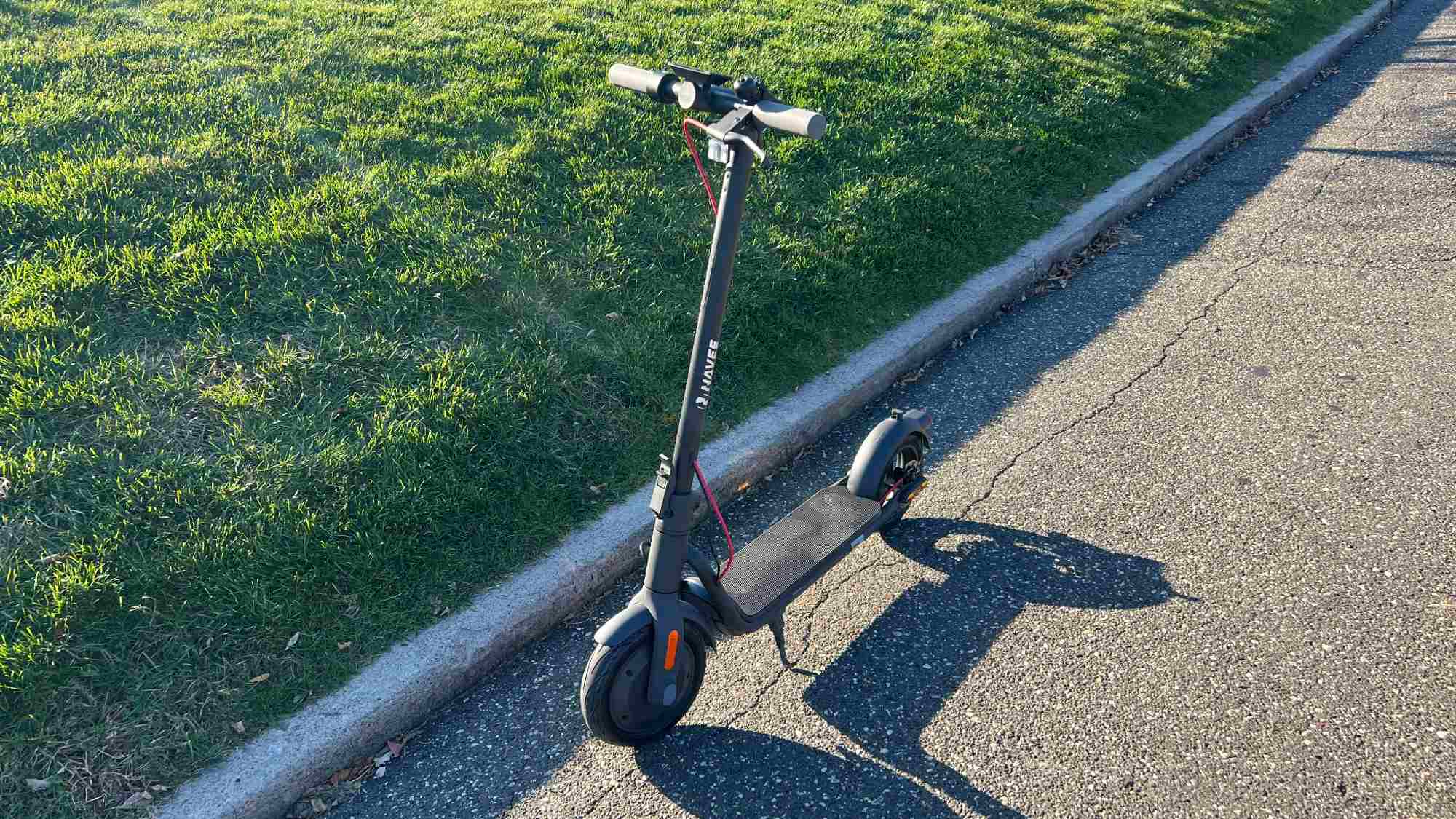
The major aesthetic difference among scooters is whether they store the battery in the stem or underneath the deck. The NAVEE V40 Pro chooses the latter. I prefer it in the stem as I live in a city riddled with potholes and bumps, which could damage the battery over time. But it doesn’t really make a difference in how the scooter operates.
With the upgraded dual-folded system, the stem can fold down and lock onto the back wheel while the handlebars turn flush with the deck. This makes it even easier to carry, store under a train seat or overhead rack, or place in a car trunk.
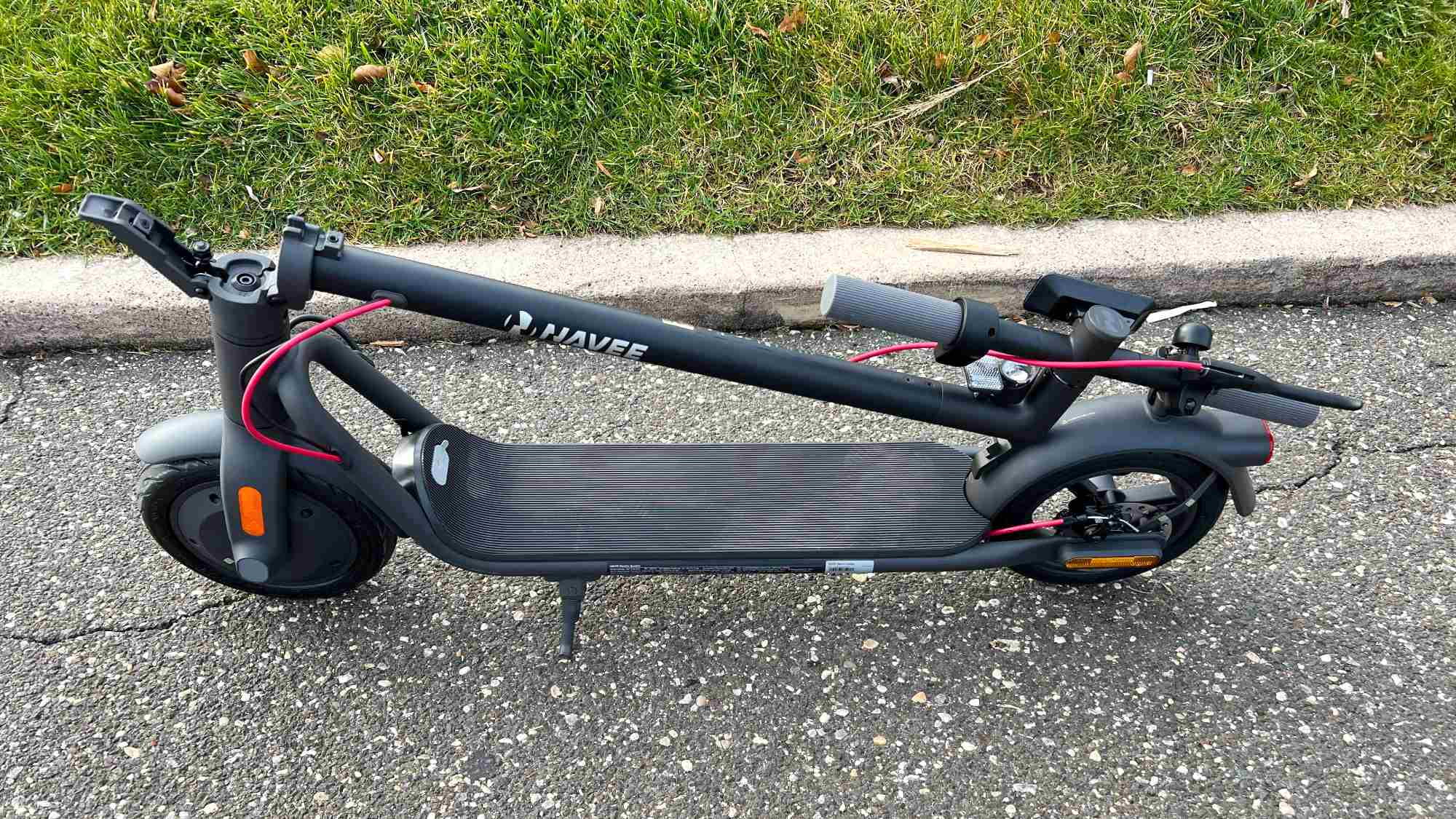
Unfortunately, carrying the NAVEE V40 Pro isn’t an option for me. At 35 pounds, it’s significantly heavier than either of the two scooters I’ve reviewed before, the Slidgo X8 (30 pounds) and the Swagtron Swagger 5 Boost (26 pounds), not to mention higher-priced models such as the Unagi Model One Voyager (29.6 pounds). I have to suppose that’s due to a heavier battery, as the NAVEE V40 Pro has a longer range than either of the two models I’ve tested.
The handlebars and an LED display sit atop the stem. On the left handle, you’ll find a bell at the brake lever that controls both the front E-ABS and rear disc brake. The right handle holds the power button and accelerator lever. The power button turns on the headlight and can toggle between the three modes (pedestrian, normal and sport).
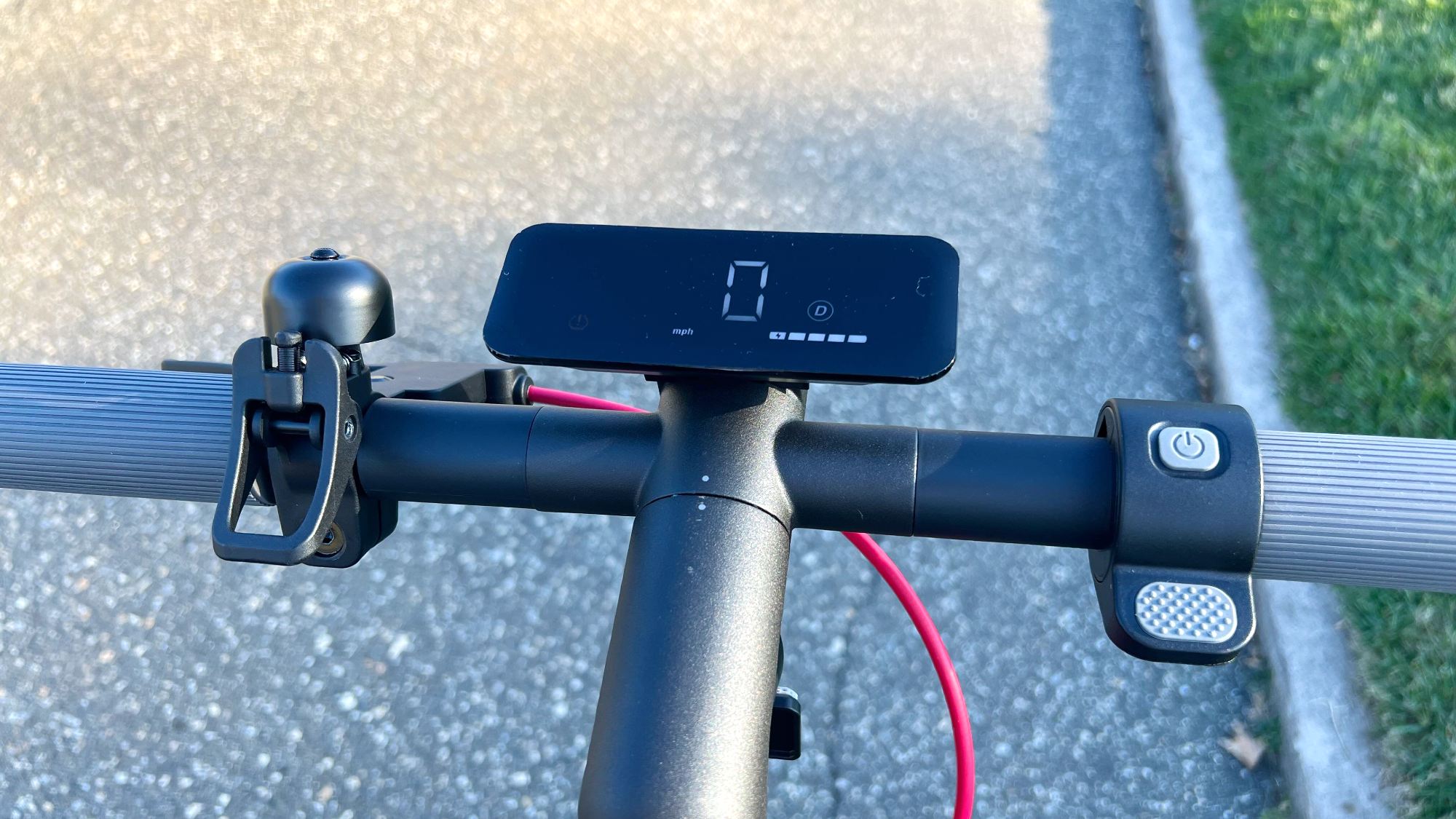
In the middle, the LED display shows the speed in large type and the mode and battery charge level. There are also status indicators for the headlight, tire inflation, temperature, Bluetooth connection and lock.
The bottom of the stem can open up to reveal a small hiding spot where you can place an Apple AirTag tracker (and possibly a Tile, though I didn’t have one to try to fit).
The deck is 6.5 inches wide and covered in a grippy material, which should fit most riders. The entire scooter has a IP55 dust and water resistance rating, which means it was tested against dust and water for up to 55 minutes at a pressure of one atmosphere. In real-world terms, you could probably ride the NAVEE V40 Pro in a drizzle or maybe even a light shower.
The 265-pound rider weight limit is pretty standard. Of course, a heavier freight will reduce performance, so take note when going on longer rides.
The NAVEE V40 Pro also lacks a foot brake, which is the main reason I personally use the Slidgo X8. I’m not sure why more scooters don’t include one.
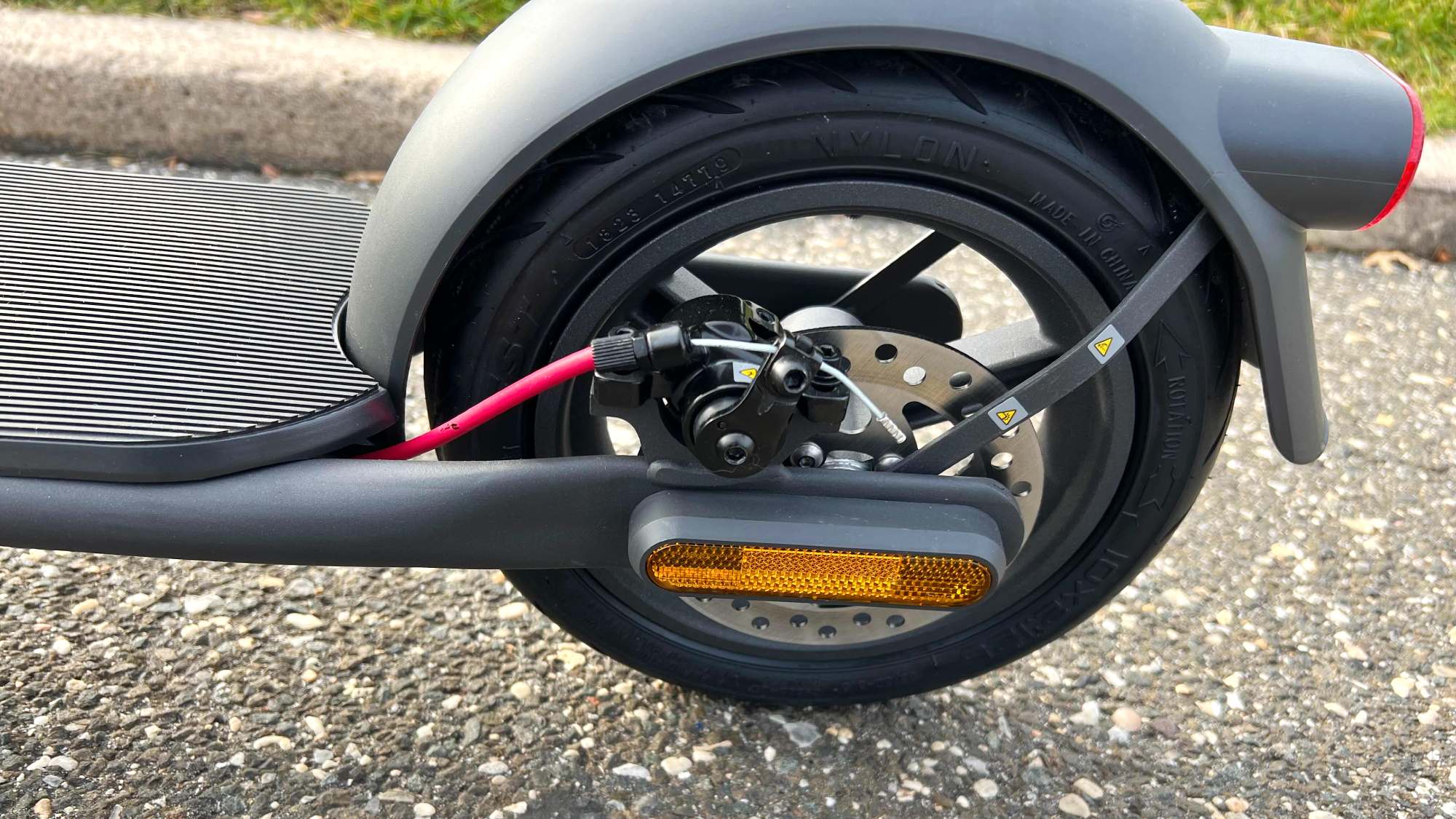
The NAVEE pairs with the Xiaomi Home app via Bluetooth. The app gives more detailed stats on the scooter and also allow you to lock it. I tried the locking system and it worked, essentially turning the scooter into a heavy, inoperable lump. However, I didn’t test it in a real-world setting, not wanting it to be stolen before this review was complete. Would I trust it if this was my own scooter? Probably not. I’m sure some ingenious thief would absolutely take the scooter lump and figure out a way to unlock and reset it. And since the NAVEE V40 Pro is too heavy for me to carry, I would have to always be sure my destination would allow a scooter to roll in.
NAVEE V40 Pro review: Performance and battery life
The NAVEE V40 Pro got quite the workout in my hilly neighborhood and beyond. It performed superbly, hitting 19 mph on a straightaway and 14 mph on a steep incline. This mostly matches the other two scooters I’ve tested.
Acceleration was powerful yet smooth, with no jerky movements. I mostly relied on sport mode (again, hilly area) as the other two modes, pedestrian and normal, max out at 3.7 mph and 12.4 mph, respectively.
The NAVEE V40 Pro has 10-inch pneumatic tires, which did give me pause. Both the Slidgo X8 and Swagtron Swagger 5 Boost have solid, airless tires which guard against flats. That’s better for city dwellers like myself. However, I quite enjoyed the smoother, more comfortable ride on the pneumatic tires. Then again, I only tested the NAVEE V40 Pro for a few weeks; after several months on pothole ridden streets, I might rue trading comfort for durability.
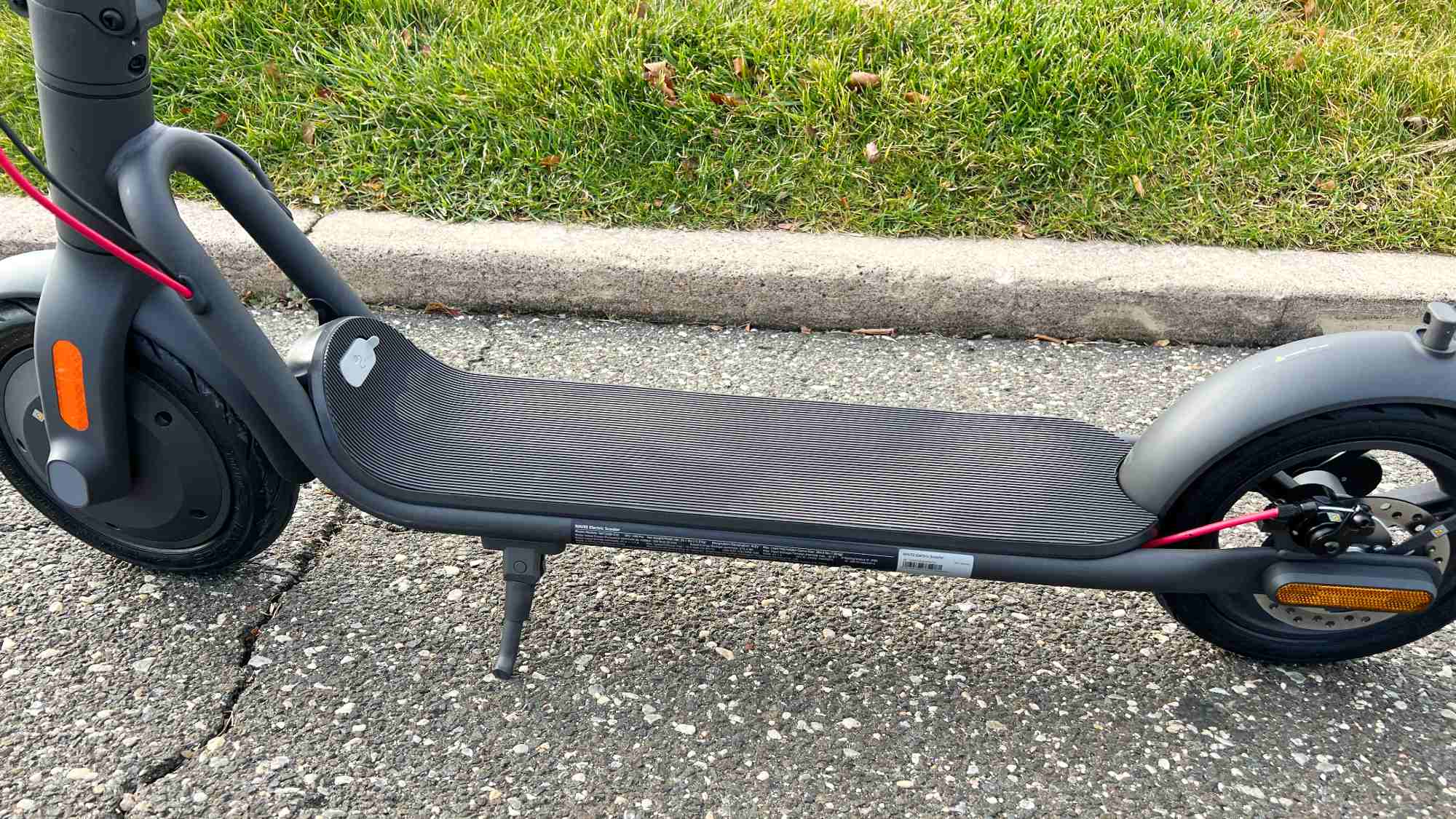
I rode it once on a misty morning for about 15 minutes, which is my personal safety max. It functioned just fine and I never felt like the scooter might slide or skid. Your mileage may vary.
At a rated 25 miles, the NAVEE V40 Pro’s range is higher than either of the two scooters previously mentioned. I took it out on several longer trips, including three times around a park loop for a total of 10 miles. Even after that, the battery charge remained at an impressive 70%. Of course, your mileage will vary, based on your size, how fast you ride, and how many hills you climb.
As I mentioned before, the NAVEE V40 Pro doesn’t have a foot brake, which I prefer in addition to a hand brake. The V40 Pro’s brakes functioned well, though at high speeds, I opted to slow down first before braking. The brake is responsive, but not too tight, so I didn’t feel in much danger of pitching headfirst over the scooter.
NAVEE V40 Pro review: Bottom line
By the end of testing, I was impressed by the NAVEE V40 Pro’s combination of range, features and performance. It won’t replace the Slidgo X8 for my personal use, but I like it better than the Swagtron Swagger 5 Boost. But the NAVEE V40 Pro is the heaviest of those three, so the dual-folding design isn’t particularly helpful to me as I will never be able to carry it anywhere.
At $529, it’s a decent option if you’re looking for a commuter scooter with a longer range. If you wait for a sale event, that price is likely to be lower (it was $399 at Best Buy during Black Friday). It’s not meant to be a budget starter scooter, nor a high-end, long-range ride. The NAVEE V40 Pro sits comfortably in the middle.
Most importantly, it does everything you want an electric scooter to do — gets you places faster than walking or biking, in a more environmentally friendly way than a car.

Kelly is the managing editor of streaming for Tom’s Guide, so basically, she watches TV for a living. Previously, she was a freelance entertainment writer for Yahoo, Vulture, TV Guide and other outlets. When she’s not watching TV and movies for work, she’s watching them for fun, seeing live music, writing songs, knitting and gardening.
